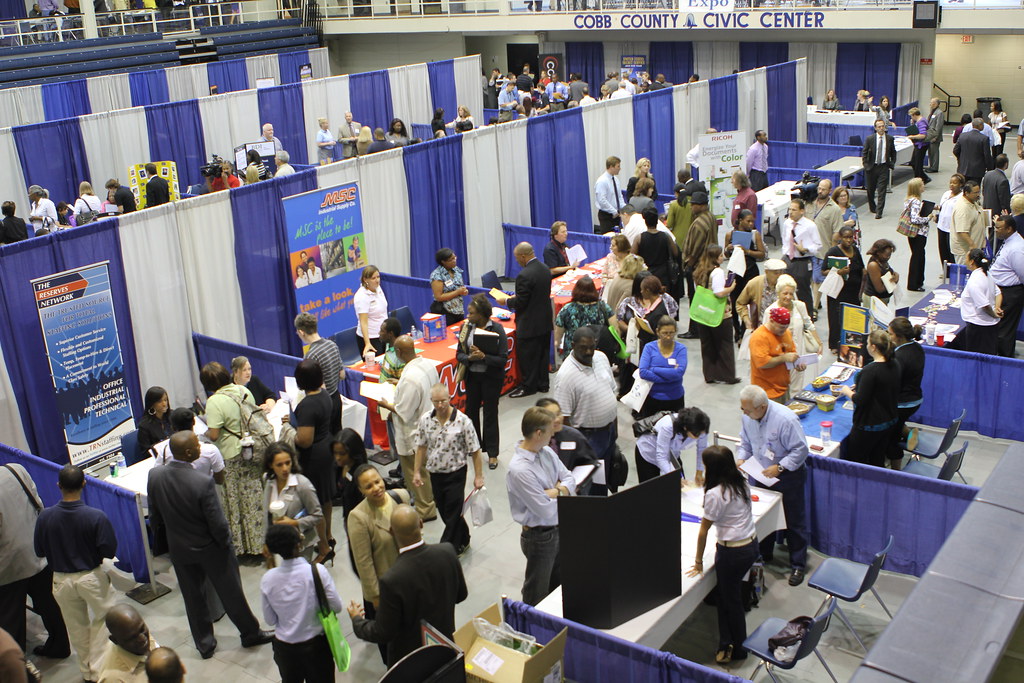
Wondering if it is worth it to attend a career fair? Whether you’re a student exploring opportunities or a recent graduate eager to launch your career, these events can provide a unique chance to connect with potential employers, discover various industries, and uncover job prospects that align with your goals. But in order to maximize your success at career fairs, you need to do more than just show up and handing out resumes.
To truly make the most of career fairs, you need a game plan. From understanding the different types of fairs to choosing the right ones, thorough preparation can significantly impact your success. This guide will walk you through every step—from researching employers and refining your pitch to making a memorable impression and following up effectively.
Types of Career Fairs
Choosing the right career fair requires an understanding of your career goals and the opportunities available. General career fairs cast a wide net, bringing together employers from diverse industries, which can be perfect if you’re exploring various paths or considering multiple fields. If you have a clear focus, industry-specific fairs are tailored to particular sectors like technology, healthcare, or finance, offering a more targeted approach to meeting specialized recruiters.
In today’s digital age, virtual career fairs have grown in popularity. These online events provide a flexible way to connect with employers without geographic limitations, making them a particularly useful option if you’re considering opportunities in different locations. On-campus career fairs, often hosted by universities, offer a comfortable setting for students and recent graduates to engage with companies actively looking to hire entry-level talent.
Preparation Before the Career Fair
Walking into a career fair unprepared can be overwhelming, but with the right preparation, you can stand out and make a great impression. Start by researching the companies attending—learn about their mission, values, and current job openings. This knowledge not only helps you decide which employers to prioritize but also equips you with insightful talking points.
1. Do your research
Before attending a fair, check which employers are attending and do some basic research. What companies interest you? Review the company website and social media media pages. If it sounds interesting check out reviews on Glassdoor or Handshake. Make sure to check out the open jobs and internships on the employer’s website, LinkedIn or Handshake page. If there is a current opening you are interested in, you’ll be prepared to discuss with those representing the company at the job fair.
2. Brush up Your resume
Take some time to review your resume. Want to stand out? Have copies of your resume printed and ready to hand out AND create a QR Code so that potential employers can scan. Be sure that any printed copies are in a folder or portfolio so that they do not get wrinkled!
3. Prepare questions and be prepared with responses
Create a lengthy list of questions in advance so that you are never standing before a potentia employer awkwardly. Have a list of at least 10 general questions you can ask any company, as well as at least 5 specific questions for every company you are truly interested in. Employers know that if you are really interested in them, you’ll have done some research, so ask questions that are not easily found on their website. Better yet, ask them to expand on something you saw on the website. Need help brainstorming a list of questions? Share the company and a bit about your background with ChatGPT, CoPilot or Claude and start brainstorming! You’ll also want to be prepared to answer some questions. While you will likely not get the time for a real interview, consider frequently asked interview questions so that you are not caught off guard!
4. Practice your Elevator Pitch
Consider your personal brand and how you are looking to present to employers. You will have an opportunity to introduce yourself, so think beyond just sharing your name and your major, but providing an introduction that will give them a glimpse of what you stand for and what makes you special. Do you have a deep passion for a career in marketing inspired by a class you took, a speaker or a brand? Do you have an exceptional work ethic as evidenced by an outstanding GPA while working jobs or playing sports in college? Whether you are very detail oriented, love to learn or bring creativity and enthusiasm, think about how you want to share this with potential employers. As an early career employee, your employer won’t expect you to have deep knowledge and experience in the field, but you will need to discern yourself from the other candidates.
5. Consider Your Appearance
You will make your first impression before you say a word. Consider how you are presenting yourself. Dress in attire that aligns with your potential industry, but remember it is always better to err on the side of formal when you are interviewing. Beyond clothing, consider personal grooming (hair, nails, etc) . How you choose to dress is up to you. How they react to your choices is up to them.
Tips for the Day of the Career Fair
To maximize your success at career fairs, begin by showing up early and being ready to engage confidently. Arriving early will allow you to get a quick lay of the land and a better chance to speak with those recruiters you are targeting before the crowds build up. Getting their early may mean that you have time for more in-depth conversations with more recruiters. When interacting with employers, maintain eye contact, offer a firm handshake, and express genuine enthusiasm—confidence goes a long way in making a positive impression.
Take notes during your conversations to remember key details that you can reference in follow-ups. Networking isn’t just limited to recruiters—engage with other attendees, as they may offer valuable insights or connections. Keeping track of business cards and contact details will help you stay organized and follow up effectively.
Post-Career Fair Follow-Up
The career fair doesn’t end when you leave the venue; your follow-up is crucial in reinforcing the connections you’ve made. Within 24-48 hours, send personalized thank-you emails to the recruiters you spoke with, expressing your appreciation and reiterating your interest in their company. Mention specific details from your conversation to make your email stand out.
Reach out and connect with EVERY recruiter you spoke to on LinkedIn. Connecting with recruiters on LinkedIn is another excellent way to stay on their radar and expand your professional network. If you learned about job openings at the fair, take prompt action by submitting your application and leveraging the insights you gained from your conversations..
Finally, take some time to reflect on your experience. What went well? What could you improve for next time? Evaluating your performance will help you refine your approach and ensure even greater success at future events. By approaching career fairs with a solid strategy and a proactive mindset, you can unlock exciting career opportunities. Start preparing today and take a step closer to your professional goals.
For more career guidance and opportunities, visit your university career center. Whether you are a current student or alumni, you will find a wealth of resources to support you. If you are looking for a private career coach, we’d love to hear from you! Your First Real Job is brought to you by Rise Consulting LLC! We provide the personal career coaching and networking assistance to help you build meaningful connections, boost your confidence, and take charge of your future.

